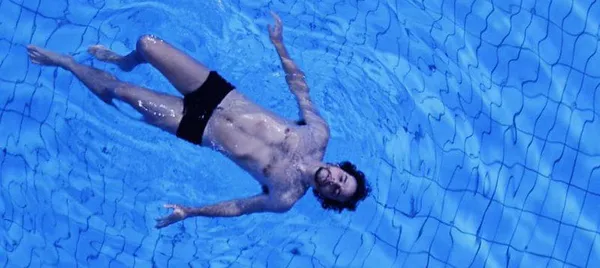Eye For Film >> Movies >> Futuro Beach (2014) Film Review
Futuro Beach
Reviewed by: Amber Wilkinson

Karim Aïnouz's film is, despite its initially strong narrative, more concerned with moods and the energy of emotions than straightforward storytelling. Carved into three segments, each progressively more philosophical and less narrative-driven than the last, it tells the story of Donato (Wagner Moura), who splits his time between being a lifeguard and larking about with his younger brother (Savio Ygor Ramos and played later, in adulthood, by Jesuíta Barbosa) who idolises his "Aquaman" bravery.
High energy is present from the outset, as we watch two bikers race across the dunes, as windmills turn languidly behind them, the men strip off as they pile down to the sea and suddenly the upbeat soundtrack is replaced by the audio assault of the act of drowning as both get into difficulty. It's a striking beginning and Aïnouz uses this notion of transformative energies - violence to love, anger to dancing - throughout the film. It is also the first hint of the colour co-ordination of the film - captured beautifully by cinematographer Ali Olay Gözkaya - which will make much of the contrast between hot reds and cool blues.

Donato - in red - is one of those trying to save the men and though German Konrad (Clemens Schick) is rescued, his friend is lost. Meeting to discuss the missing body, it quickly becomes clear there's a spark between the two men and they become lovers. It's interesting to note that although their relationship drives the film and sex scenes are present, the fact that they are gay is refreshingly incidental - this is about deeper universal ideas of commitment, fear and choice.
The second segment of the film concerns what happens to the couple when Donato goes to visit Konrad in Berlin, while the third section sees Donato's past infect his present. Aïnouz emphasises the contrasting environments Donato finds himself in as a way of helping us feel his dislocation. In Brazil, waves of sound are almost always present, along with bright lights and the movement of the sea. The water in Berlin, by contrast, lies still and dark beneath bridges or is confined within an aquarium tank, the light flat and dominated by the blues that come to characterise Konrad just as the reds are associated with Donato. In this landscape, the freedom lies, for the most part, in the manmade confines of brightly lit discos, where more than one character will seek a retreat.
Aïnouz gets his actors to use their physicality to the full, whether it is slamming a plaster cast in frustration or dancing as though no one is watching. Movement is everywhere, with people rarely standing still so that, when they do, it is strikingly noticeable. Some viewers will find the measured ebb and flow of emotions in the film frustrating, particularly in the metaphor-heavy final segment - but if you're willing to go with the flow, this study of emotion develops and maintains a sensual and sensory intensity.
Reviewed on: 12 May 2015


















